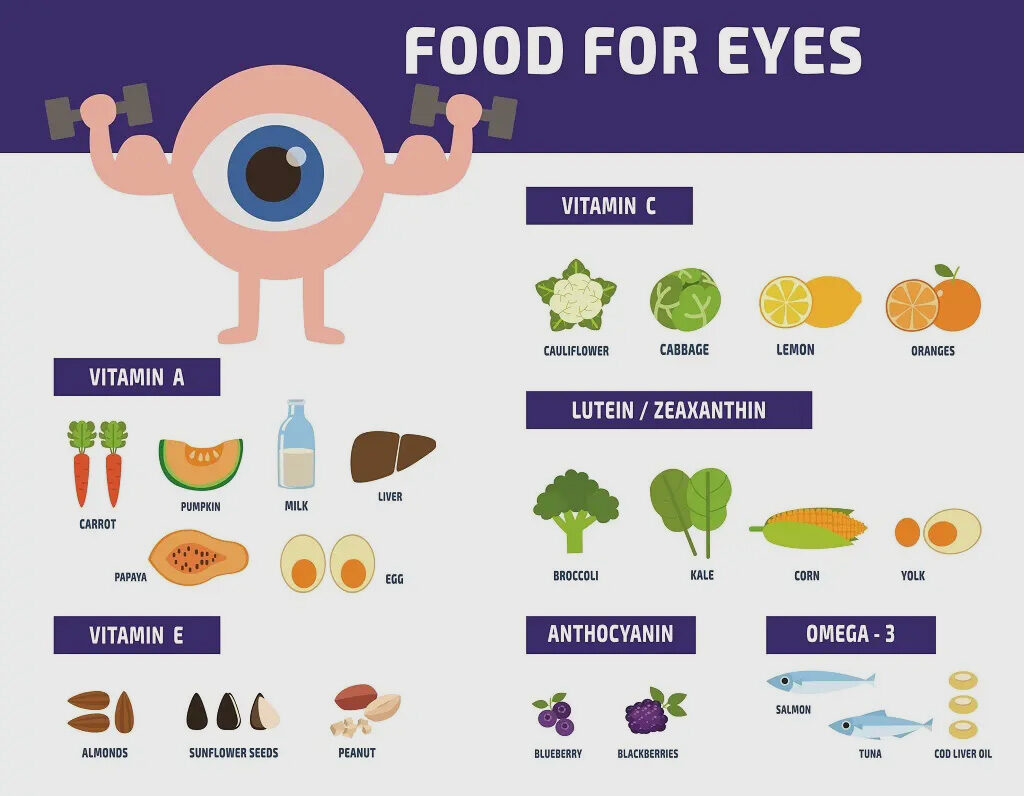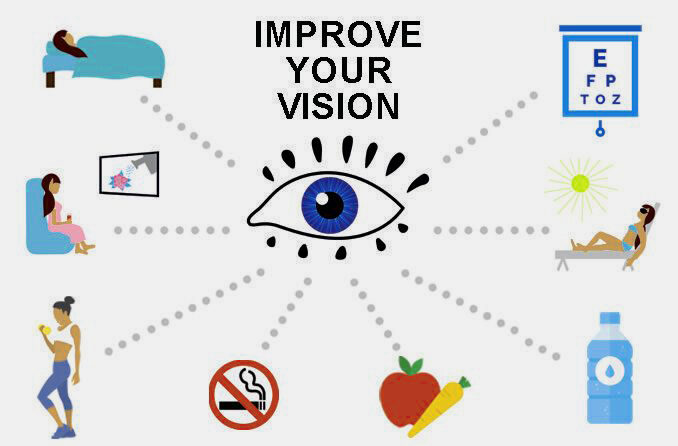Natural Ways to Improve Vision and Eye Health
Maintaining good vision and eye health is crucial for overall well-being. While genetics play a role in eye health, lifestyle choices, diet, and other natural methods can significantly impact your vision. Here’s a comprehensive guide to natural ways to help improve vision and maintain healthy eyes.
1. Nutrition for Eye Health
A balanced diet rich in essential nutrients is key to maintaining healthy eyes. Certain vitamins and minerals are known to support eye health and may help improve vision over time.
- Vitamin A: Essential for maintaining the health of the retina and preventing night blindness. Sources include carrots, sweet potatoes, and leafy greens.
- Vitamin C: An antioxidant that helps protect the eyes from damage caused by free radicals. Found in citrus fruits, strawberries, and bell peppers.
- Vitamin E: Another powerful antioxidant that protects eye cells from oxidative stress. Sources include almonds, sunflower seeds, and spinach.
- Omega-3 Fatty Acids: These essential fats support the structure of the cell membranes in the eyes. They are found in fish like salmon, flaxseeds, and walnuts.
- Lutein and Zeaxanthin: Carotenoids that filter harmful blue light and support the health of the retina. Found in kale, spinach, and egg yolks.
- Zinc: A mineral that helps transport vitamin A from the liver to the retina, producing melanin, a protective pigment in the eyes. Found in oysters, beef, and chickpeas.

2. Eye Exercises
Just like other muscles in your body, your eye muscles can benefit from regular exercise. Eye exercises can help improve focus, reduce eye strain, and enhance visual acuity.
- Palming: Rub your hands together to generate heat, then gently cup them over your closed eyes without applying pressure. This relaxes the eye muscles and relieves strain.
- Figure Eight: Imagine a large figure eight about 10 feet in front of you. Trace it with your eyes for a few minutes, then switch directions. This improves flexibility and focus.
- 20-20-20 Rule: Every 20 minutes, take a 20-second break to look at something 20 feet away. This reduces eye strain, especially for those who spend long hours in front of screens.
- Focus Shifting: Hold your thumb about 10 inches away from your face and focus on it for 10 seconds. Then, shift your focus to an object 20 feet away for another 10 seconds. Repeat several times.
3. Protecting Your Eyes from Harmful UV Rays
Exposure to the sun’s ultraviolet (UV) rays can damage your eyes and increase the risk of cataracts and macular degeneration. To protect your eyes:
- Wear Sunglasses: Choose sunglasses that block 100% of both UVA and UVB rays.
- Wear a Hat: A wide-brimmed hat can block about half of UV rays and reduce the risk of eye damage.
- Avoid Direct Sunlight: Try to avoid direct exposure to sunlight, especially during peak hours (10 a.m. to 4 p.m.).
4. Reducing Digital Eye Strain
Prolonged use of digital devices can lead to digital eye strain, also known as computer vision syndrome. Symptoms include dry eyes, headaches, and blurred vision.
- Blue Light Filters: Use blue light filtering screens or glasses to reduce exposure to harmful blue light emitted by screens.
- Adjust Screen Settings: Increase the text size, adjust brightness, and reduce glare on your screens.
- Maintain Proper Distance: Keep your computer screen about 20-30 inches away from your eyes and slightly below eye level.

5. Adequate Hydration
Staying hydrated is important for maintaining eye moisture and preventing dry eyes. Drink plenty of water throughout the day to keep your eyes well-lubricated.
- Use a Humidifier: If you live in a dry climate or spend a lot of time in air-conditioned environments, a humidifier can help maintain moisture levels in the air.
- Hydrating Eye Drops: For those who suffer from chronic dry eyes, using preservative-free eye drops can provide relief and maintain eye moisture.
6. Getting Enough Sleep
Adequate sleep is essential for overall health, including eye health. Lack of sleep can lead to dry eyes, twitching, and blurred vision.
- Sleep Hygiene: Create a relaxing bedtime routine, maintain a regular sleep schedule, and ensure your bedroom is conducive to sleep.
- Avoid Screen Time Before Bed: Reduce exposure to screens at least an hour before bedtime to improve sleep quality.
7. Quit Smoking
Smoking increases the risk of eye diseases such as cataracts, macular degeneration, and optic nerve damage. Quitting smoking can improve your eye health and reduce the risk of vision loss.
8. Regular Eye Exams
Even if you have perfect vision, regular eye exams are crucial for detecting potential problems early. An eye exam can identify issues like glaucoma, diabetic retinopathy, and age-related macular degeneration before they cause significant damage.
- Frequency of Exams: Adults should have a comprehensive eye exam every two years, while those over 60 or with risk factors should have annual exams.
Conclusion
Taking care of your eyes is essential for maintaining good vision and overall health. By incorporating a nutritious diet, practicing eye exercises, protecting your eyes from UV rays, reducing digital eye strain, staying hydrated, getting enough sleep, quitting smoking, and having regular eye exams, you can naturally improve your vision and support your eye health for years to come.





